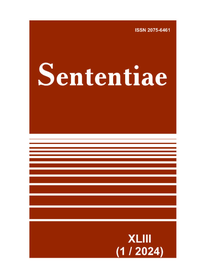Час і простір у філософії Ляйбніца. Частина IV
DOI:
https://doi.org/10.31649/sent43.01.090Ключові слова:
континуум, ідеальне, реальне, можливе, дійсне, Райхенбах, АрістотельАнотація
Інтерв’ю Аріни Орєхової з професором Сергієм Секундантом, присвячене Ляйбніцевій концепції часу і простору, особливостям тлумачення цієї концепції Майклом Фатчем та різноманітним історико-філософським підходам до розуміння філософії Ляйбніца в цілому.
Посилання
Anapolitanos, D. A. (1999). Leibniz: Representation, Continuity and the Spatiotemporal. Dordrecht: Springer. https://doi.org/10.1007/978-94-015-9147-8
Futch, M. J. (2008). Leibniz's metaphysics of time and space. Boston: Springer. https://doi.org/10.1007/978-1-4020-8237-5
Grosholz, E. (2010). Leibniz's metaphysics of time and space (review). Journal of the History of Philosophy, 48(2), 246-247. https://doi.org/10.1353/hph.0.0208
Hill, J. Ch. R. (2008). Leibniz’ Metaphysics of Intentionality. A thesis. National University of Singapore.
Khamara, E. (1993). Leibniz’s Theory of Space: A Reconstruction. Philosophical Quarterly, 43, 472-488. https://doi.org/10.2307/2219987
Leibniz, G. W. (1849-1863). Leibnizens mathematische Schriften, (Bd. 1-7). (C. I. Gerhardt, Hrsg.). Berlin & Halle: Asher.
Leibniz, G. W. (1875-1890). Die Philosophischen Schriften (Bd. 1-7). (C. I. Gerhardt, Hrsg.). Ber-lin: Weidmann.
Leibniz, G. W. (1923-). Sämtliche Schriften und Briefe (Reihe I-VIII). (Preussischen (Deutschen; Berlin-Brandenburgische) Akademie der Wissenschaften, Hrsg.). Darmstadt, Leipzig & Ber-lin: De Gruyter; Academie Verlag.
Reichenbach, H. (1977). Gesammelte Werken in 9 Bände. Bd.2: Philosophie der Raum-Zeit-Lehre. Wiesbaden: Springer. https://doi.org/10.1007/978-3-663-13988-1_2
Secundant, S. (2013). Leibniz's epistemology in its normative-critical foundations. [In Russian]. Odesa: Pechatnyii Dom.
Secundant, S. (2023). Epistemologie und Metaphysik: zum Begriff der Wissenschaftstheorie und Wissenschaftsphilosophie bei Leibniz. In W. Li, C. Wahl et al. (Hrsg.): «Le present est plein de l’avenir, et chargé du passé» : Vorträge des XI. Internationalen Leibniz-Kongresses, 31. Juli – 4. August 2023, Leibniz Universität Hannover, Deutschland (Bd. 3, S. 282-293). Hannover: Gottfried-Wilhelm-Leibniz-Gesellschaft.
Secundant, S., & Oriekhova, A. (2022a). Time and Space in the Philosophy of Leibniz. Part I. [In Ukrainian]. Sententiae, 41(2), 98-123. https://doi.org/10.31649/sent41.02.098
Secundant, S., & Oriekhova, A. (2022b). Time and Space in the Philosophy of Leibniz. Part II. [In Ukrainian]. Sententiae, 41(3), 91-116. https://doi.org/10.31649/sent41.02.098
Secundant, S., & Oriekhova, A. (2023). Time and Space in the Philosophy of Leibniz. Part III. [In Ukrainian]. Sententiae, 42(2), 87-110. https://doi.org/10.31649/sent41.02.098
Vailati, E. (1997) Leibniz and Clarke: A Study of their Correspondence. New York: Oxford University Press. https://doi.org/10.1093/oso/9780195113990.001.0001
##submission.downloads##
-
PDF
Завантажень PDF: 211
Опубліковано
Як цитувати
Номер
Розділ
Ліцензія

Ця робота ліцензується відповідно до Creative Commons Attribution 4.0 International License.
Автори, які публікуються у цьому журналі, згодні з такими умовами:
- Автори зберігають авторське право і надають журналу право першої публікації.
- Автори можуть укладати окремі, додаткові договірні угоди з неексклюзивного поширення опублікованої журналом версії статті (наприклад, розмістити її в інститутському репозиторії або опублікувати її в книзі), з визнанням її первісної публікації в цьому журналі.
- Авторам дозволяється і рекомендується розміщувати їхню роботу в Інтернеті (наприклад, в інституційних сховищах або на їхньому сайті) до і під час процесу подання, бо це може привести до продуктивних обмінів, а також скорішого і ширшого цитування опублікованих робіт.









.jpg)
.png)



